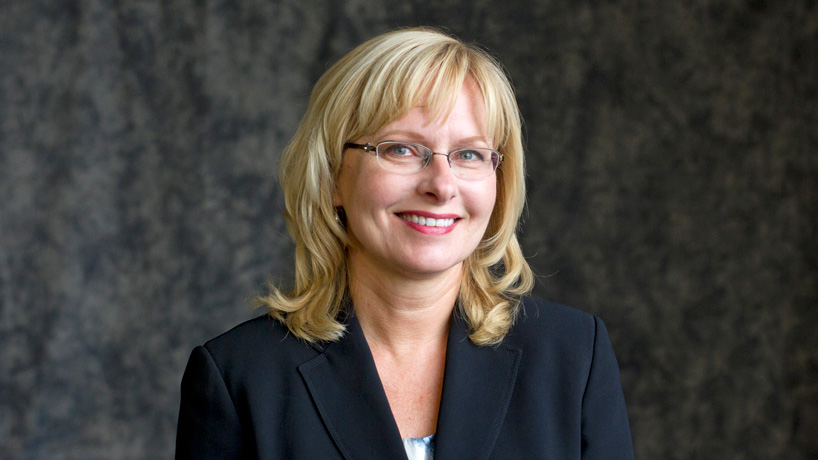
Janet Lauritsen is set to become third UMSL faculty member to serve as president of the American Society of Criminology after Bob Bursik in 2008 and Richard Rosenfeld in 2010. She will first spent a year as president-elect beginning on Nov. 21. (Photo by August Jennewein)
Janet Lauritsen considers the American Society of Criminology her professional home, and she’s been attending its annual meeting – and frequently presenting her research there – for the better part of 35 years.
But Lauritsen, a Curators’ Distinguished Professor of Criminology and Criminal Justice at the University of Missouri–St. Louis, never imagined when she first joined the organization as a graduate student in sociology at the University of Illinois that she’d ever be elected to serve as its president.
That’s exactly what happened this summer in a vote of the membership this summer, and Lauritsen is now set to begin a year as president-elect on Nov. 21 before taking over as president next November.
“It’s quite an honor to have been selected to serve as president,” Lauritsen said. “We have thousands of members, and it’s really humbling to think my colleagues think that I’m a good person for this job.”
Lauritsen is the third member of the UMSL’s Department of Criminology and Criminal Justice to be chosen ASC president, following the late Bob Bursik in 2008 and Curators’ Distinguished Professor Emeritus Richard Rosenfeld in 2010.
The ASC started in the United States in 1941 but has expanded around the globe with members coming from Europe, Asia and Australia, as well as North and South America.
Those members aim to pursue scholarly, scientific and professional knowledge concerning the measurement, etiology, consequences, prevention, control and treatment of crime and delinquency.
The Society, in turn, encourages them to exchange research and ideas across disciplines, thereby helping set the direction of the field.
Much of that collaboration occurs at the ASC’s annual meeting each November, which typically includes about 3,000 presenters.
A big part of Lauritsen’s work as president – along with serving on the ASC’s finance and policy committees – will be to form the program committee that will plan and organize the 2022 Annual Meeting. She expects to recruit around 50 people to contribute to that challenge.
Lauritsen is responsible for choosing the theme for the gathering and will select so-called presidential sessions that will be featured during the event. She will also be tasked with delivering a presidential address.
“That’s something I have to give careful thought to, and it’s a little early, but it’s not actually early,” Lauritsen said. “I’ve been thinking about this since they told me I was elected.”
Lauritsen would like the theme for both the meeting and the address to look to the future of criminology. One issue she believes is key to that future is finding ways to modernize and improve the nation’s crime statistics. She’s worked extensively with the U.S. Department of Justice to make progress to that end.
“We are lacking basic information on a lot of different types of crime that we need to develop federal infrastructure for,” she said. “That includes crimes by and against businesses, by and against organizations and governments, and against the environment.”
Some of those crimes didn’t yet exist when Lauritsen began her career.
“In the U.S. right now, we literally do not know what the level is, for example, of ransomware attacks on small businesses or around small governments and how rapidly that’s increasing,” she said. “Without that information, we can’t make any decisions about whether we’re dedicating adequate resources for solving those problems.”
Her own specialty – victimization – has changed considerably since she was a graduate student in the mid 1980s. At that time, most criminology research still focused on the perpetrators of crime, but she’s seen that change with increased attention on data from the National Crime Victimization Survey, which started in 1972 and administered by the U.S. Census Bureau.
When she was earning her PhD, she often felt like she was working in a subspecialty, but victimization research is now very much part of criminology’s mainstream.
“There are a lot more researchers engaged in work that is designed to try to help people minimize their risk,” she said. “I think a lot of criminologists find that to be satisfying work.”
One perk Lauritsen is looking forward during her time as president is the opportunity to recognize colleagues by handing out awards, including for best paper, best book and best young scholar. She’ll also get a chance to honor new the ASC’s newly named fellows – an honor she received in 2013 – and choose the recipient of the President’s Award for Distinguished Contributions to Justice, given annually to an individual or organization who has made significant and distinguished contributions to the cause of justice.














